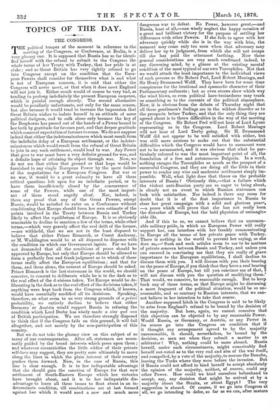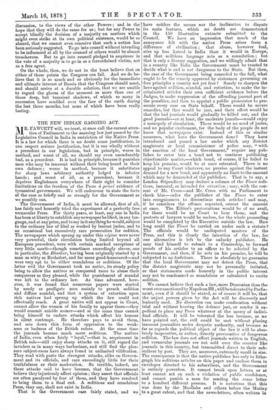TOPICS OF THE DAY.
THE CONGRESS. THE political temper of the moment in reference to the meeting of the Congress, or Conference, at Berlin, is a very gloomy one. It is supposed that Russia has so far identi- fied herself with the refusal to submit to the Congress the whole terms of her Treaty with Turkey, that her pride is at sfake ; and as Great Britain has very rightly refused to go into Congress except on the condition that the Euro- pean Powers shall consider for themselves what is and what is not of European concern, it is said that either the Congress will never meet, or that when it does meet England will not join it. Either result would of course be very bad, as tending to prolong indefinitely the present European suspense, which is painful enough already. The second alternative would be peculiarly unfortunate, not only for the same reason, but also because it would tend to increase the impression that Great Britain wishes to isolate herself in an attitude of mere political dudgeon, and to sulk alone only because the key of the Bosphorus has passed out of the hands of a Power bound to her both by gratitude for favours past., and that deeper gratitude which comes of expectation of favours to come. We do not suppose indeed that either the indeterminateness which must result from the indefinite delay of a European settlement, or the indeter- minateness which would result from the refusal of Great Britain to join in any such settlement, would lead to war. Any Power that goes to war must have a very definite ground for war, and a definite hope of attaining its object through war. Now, we do not see that either that ground or that hope would be furnished to any single European Power by the mere failure of the negotiations for a European Congress. But war or no war, it would be a great calamity to have all these critical questions left open for an indefinite period, or to have them insufficiently closed by the concurrence of some of the Powers, while one of the most import- ant of them stood angrily aloof. Nor, indeed, is there any proof that any of the Great Powers, except Russia, would be satisfied to enter on a Conference without conditioning that Europe should form her own estimate of the points involved in the Treaty between Russia and Turkey likely to affect the equilibrium of Europe. It is so obviously reasonable to decline to sanction a few of the terms, while other terms,—which very gravely affect the real drift of the former, —are withheld, that we are not in the least disposed to believe that either Prince Bismarck, or Count Andrassy, or M. Waddington would be at all disposed to dispense with the condition on which our Government iyists. For we have not demanded that all the conditions of peace should be approved by Europe, but only that Europe should be allowed to form a perfectly free and frank judgment as to which of these terms really affect the European equilibrium ; and that for them, and them alone, the consent of Europe should be asked. Prince Bismarck is the last statesman in the world, we should conceive, to consent to deliberate while he is in the dark as to the real effect of the d3cisions taken. Yet Europe would be de- liberating in the dark as to the real effect of the decisions taken, if anything were kept back from the Congress which, if known, would have essentially modified all its decisions. Speaking, therefore, on what seem to us very strong grounds of a priori probability, we entirely decline to believe that either Germany or Austria would support Russia in refusing the condition which Lord Derby has wisely made a sine qua non of British participation. We are therefore strongly disposed to think that if the Congress fails on this ground, it will fail altogether, and not merely by the non-participation of this country.
But we do not take the gloomy view on this subject of so many of our contemporaries. After all, statesmen are neces- sarily guided by the broad interests which press upon them ; and whatever eccentricities the little eddies of their private self-love may suggest, they are pretty sure ultimately to move along the lines in which the plain interest of their country pushes them forward. Now, in the ease of Russia, this line is clear enough. It is to her indisputable advantage that she should gain the sanction of Europe for that new settlement of South-Eastern Europe which her victories have brought about, and it is to her indisputable dis- advantage to leave all these issues to float about in an in- determinate condition, till combinations are at last formed against her which it would need a new and much more dangerous war to defeat. No Power, however great,—and. Russia, least of all,—can wisely neglect the happy occasion of a great and brilliant victory for the purpose of settling her differences with other Powers. If she fails to agree with her adversary quickly while she is in the way with him, the. moment may come only too soon when that adversary may deliver her up to judgment, from which she will not escape till she has paid the uttermost farthing. Now these general considerations are very much confirmed indeed, to any discerning mind, by a glance at the existing mental condition of the most typical of our own Turcophiles. Not that we would attach the least importance to the individual views of such persons as Sir Robert Peel, Lord Robert Montagu, and Sir Henry Drummond Wolff. They have been for some time conspicuous for the irrational and spasmodic character of their Parliamentary outbursts ; but as even straws show which way the wind blows, so even political hare-brainedness may teach us something as to the currents of the political atmosphere. Now, it is obvious from the debate of Thursday night that all these gentlemen's feelings are in the wildest disorder as to the prospects before Turkey, and that the only thing they are agreed about is to throw difficulties in the way of the meeting of the Congress. Sir Robert Peel will not hear of Lord Lyons representing us in the Congress. Lord Robert Montego will not hear of Lord Derby going. Sir H. Drummond Wolff did not appear to be well satisfied with either, but was still more anxious to make out that the substantial difficulties which the Congress would have to surmount were not to be surmounted, and it was obvious that what he par- ticularly referred to was the most important point of all, the foundation of a free and autonomous Bulgaria. In a word,. nothing enrages the Turcophiles so much as the prospect of a successful Congress, and they are doing all the little in their power to render any wise and moderate settlement simply im- possible. Well, what light does that throw on the probable interests of Russia ? Obviously this,—that a failure which the violent anti-Russian party are so eager to bring about, is clearly not an event to which Russian statesmen can look with satisfaction. Nor indeed is there any room for doubt that it is of the first importance to Russia to close her great campaign with a solid and glorious peaco, —a peace which will prove that she has not really been the disturber of Europe, but the bold physician of unimagin- able ills.
And if this be so, we cannot believe that an unreason- able military pride, in which no European Power will really support her, can interfere with her frankly communicating to Europe all the terms of her private peace with Turkey. There is nothing in the world to prevent her saying, as she does so,—' Such and such articles seem to me to be matters of private concern between Russia and Turkey, and unless you. can succeed in convincing me that they are really of grave importance to the European equilibrium, I shall decline to discuss them with you. I will discuss with you their bearing. on the peace of Europe, if you think that they have a real bearing on the peace of Europe, but till you convince me of that, I will not discuss with you the question of modifying them.' That would, we conceive, be reasonable enough. But to keep back any of those terms, so that Europe might be discussing a mere fragment of the political situation, would be so un- reasonable, and so contrary to Russian interests, that we can- not believe in her intention to take that course.
Another supposed hitch in the Congress is said to be likely to arise from England's refusal to be bound by the decision of the majority. But here, again, we cannot conceive that this objection can be objected to by any reasonable Power. Would Russia, or Germany, or Austria, or any Power in its senses go into the Congress on condition that if it thought any arrangement agreed to by the majority unreasonable, it should, nevertheless, be bound by the decision, as men are when they submit a matter to an arbitrator ? Why, nothing could be more absurd. Russia herself, under such circumstances, might conceivably find. herself out-voted as to the very end and aim of the war itself, and compelled, by a vote of the majority,to recross the Danube, leaving the Turks where they were before the invasion. But if Russia could not afford to bind herself to accept absolutely the opinion of the majority, neither, of course, could any other Power. How could we bind ourselves beforehand to accept, say, any decision that might be arrived at by a majority about the Straits, or about Egypt? The very suggestion is absurd. Of course, if we go into Congress at all, we go intending to defer, so far as we can, after mature discussion, to the views of the other Powers ; and in the hope that they will do the same for us ; but for any Power to accept blindly the decision of a majority on matters which might even strike at its own political existence, would be so absurd, that we cannot even conceive that such a notion has been seriously suggested. To go into council without intending to be influenced at all by the counsel of others would be almost treacherous. But to go into council pledged to acquiesce in the vote of a majority is to go in as a foreordained victim, not as a free agent. On the whole, then, we do not in the least believe that on either of these points the Congress can fail. And we do be- lieve that it is so much and so obviously for the immediate and ultimate interest of Russia that the Congress should meet, and should arrive at a durable solution, that we are unable to regard the gloom of the moment as more than one of those deep, but transient shadows, of which so many in succession have scudded over the face of the earth during the last three months, but none of which have been really lasting.



































 Previous page
Previous page